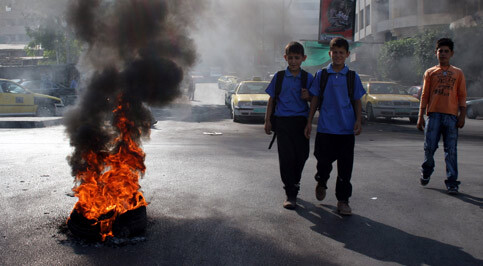Palestinian Center for Human Rights 5 September 2006

Palestinian students leave school due the civil servant strike in the West Bank city of Nablus, 5 September 2006. (MaanImages/Rami Swidan)
PCHR calls upon the Palestinian government to negotiate directly with representatives of civil servants to reach a solution guaranteeing the immediate payment of their salaries and wages. The Centre calls upon all concerned to immediately stop all forms of militancy involvement and interference in governmental institutions either for or against the strike.
Civil servants working in all governmental institutions in the Occupied Palestinian Territory (OPT), including the education and health sectors, started an open general strike on Saturday, 2 September 2006. They are requesting the immediate payment of their salaries, which have not been paid for more than six months, and the regular payment of their salaries in the future. Most ministries and governmental institutions have stopped work, especially the education and health sectors. An estimated 60-90% of the work was halted in these institutions throughout the OPT. Most governmental schools stopped work and refused to admit students at the start of the new school year. Governmental hospitals and health clinics stopped providing services except in emergency cases. In addition, thousands of civil servants protested inside their workplaces, announcing an open general strike.
The strike of civil servants has raised different reactions from its supporters and opposition. The Palestinian government considered the strike illegal, and called upon all civil servants to stop the strike immediately and return to work. The government called upon civil servants to direct their protest against Israeli Occupation Forces (IOF) and the parties that are imposing a siege on the Palestinian people. The government hired volunteers to work in place of the striking teachers. On the other hand, the representatives of the striking workers, including the Union of Civil Employees and the Teachers’ Union, considered the strike a legal action for the payment of their salaries for the past six months, and for the regular payment of their salaries in the future.
The past three day of the strike have witnessed violent actions by armed groups opposing the strike and those supporting it throughout the OPT. A number of civil servants, especially those in the education and health sectors, were assaulted by members of security services and armed groups.
PCHR realizes the humanitarian demands of civil servants in the OPT, especially in light of the deterioration of living conditions. The Centre points to the following:
PCHR Calls for:
Related Links